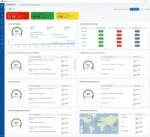
Upbound, the company known for the Crossplane open-source project, has introduced “Spaces,” a new feature allowing platform teams to deploy managed control planes in self-managed environments.
Upbound’s managed control planes offer improved scalability, declarative APIs, and Git integration, catering to a range of self-managed needs, including air-gapped and private cloud environments. These control planes help businesses simplify complex infrastructure management while adhering to data security, compliance, and operational control requirements.
“By using Upbound, we are able to shift complex cloud-native management and deployment to a highly scalable service rather than trying to manage it all ourselves,” said Dylan Moore, principal engineer, Variphy. “Upbound’s new self-hosted feature gives us more options for where we deploy managed control planes. This helps us be more efficient while allowing flexibility for future deployment requirements.”
The new feature offers “run everywhere” control planes, providing both managed and self-hosted options for businesses with strict compliance and data sovereignty requirements. With “Spaces,” connectivity to Upbound is not needed, granting platform teams full control over their control plane data while enabling scalability, automation, and efficiency.
These control planes can now be decoupled from Kubernetes clusters, allowing multiple control planes to run in Space, optimizing infrastructure utilization. Control planes can be set up quickly without requiring a new Kubernetes cluster for each.
It also offers a declarative API, resembling Kubernetes-style, to create new managed control planes within a Space. Additionally, Git integration is available in alpha, allowing teams to define APIs and use Git workflows for control plane changes. Spaces can work with various version control services, including GitHub, GitLab, Bitbucket, and others supporting Git authentication.








